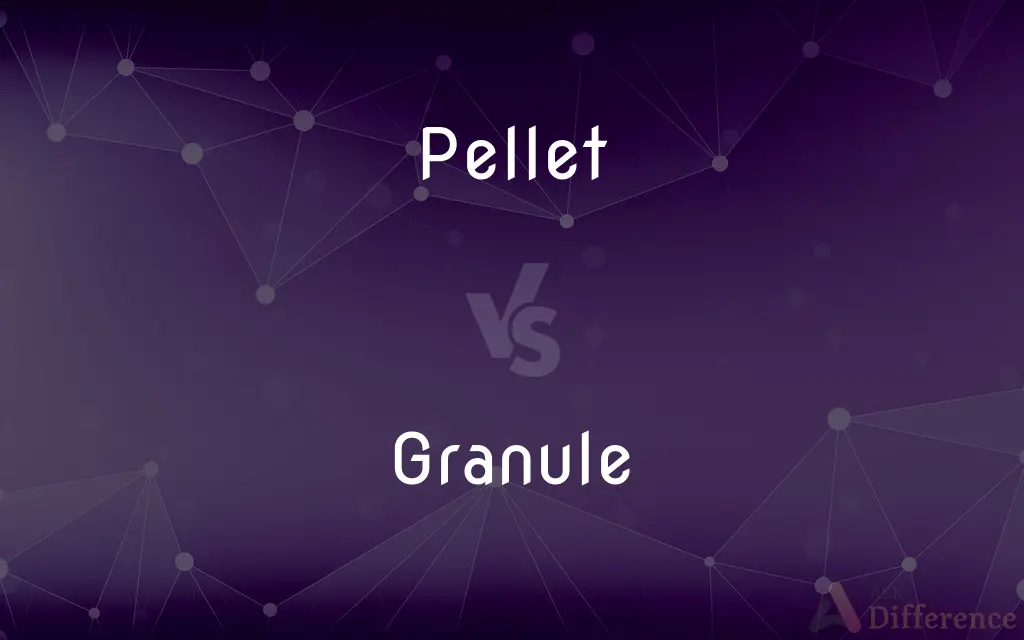Pellet vs. Granule — What's the Difference?
By Tayyaba Rehman — Published on December 20, 2023
A pellet is a small, rounded, compressed mass, often made for specific purposes, while a granule is a small particle or grain, usually a fragment of a larger whole. Both refer to small formations, but their creation and use differ.

Difference Between Pellet and Granule
Table of Contents
ADVERTISEMENT
Key Differences
A pellet and a granule are both small entities, but they serve different functions and are characterized differently. A pellet is typically a small, rounded object that has been compressed or shaped from a material. Often, pellets are designed for a specific use, such as fuel for stoves or food for animals. In contrast, a granule is a tiny particle or grain. It's often seen as a fragment or smaller part of a larger whole.
In many industries, the distinction between a pellet and a granule is crucial. For example, in the pharmaceutical industry, pellets can be specially formulated units for drug delivery, while granules might be smaller, irregular particles that make up a part of a drug mix. This shows how pellets often have a specific design and purpose, whereas granules are more general.
The manufacturing processes for pellets and granules also differ. Pellets are typically formed through processes that involve compression or extrusion. They're intentionally molded into a particular shape for a specific need. Granules, on the other hand, can be naturally occurring or may result from the breakdown of larger materials.
In everyday language, someone might refer to a pellet of wood or a pellet of food, emphasizing its design for a particular use. A granule, in contrast, would more likely be used in contexts like a granule of sugar or a granule of sand, indicating its natural, fragmentary state.
Comparison Chart
Definition
Small, rounded, compressed mass
Small particle or grain
ADVERTISEMENT
Intentionality
Often designed for a specific use
Typically a fragment of a larger whole
Manufacturing
Formed through compression or extrusion
Can be naturally occurring or broken down
Examples
Fuel pellets, animal food pellets
Sugar granules, sand granules
Usage in industries
Specific design for functions like drug delivery
General, can be part of larger mixes
Compare with Definitions
Pellet
Compressed material formed into tiny cylinders or spheres.
The wood pellet stove provides efficient heating.
Granule
A tiny fragment or piece of a larger material.
She noticed a granule of sand in her shoe.
Pellet
A tiny, molded object used for a specific purpose.
The fish tank included a feeder filled with pellet food.
Granule
A small, grain-like particle.
A granule of sugar spilled on the table.
Pellet
A compacted item used in various industries.
The factory produces metal pellets for the automotive industry.
Granule
A minute particle, often naturally occurring.
The scientist examined the granule under the microscope.
Pellet
A small, solid or densely packed ball or mass, as of food, wax, or medicine.
Granule
A minuscule segment, typically used in a broader context.
The recipe required a granule of salt for taste.
Pellet
A bullet or piece of small shot.
Granule
A small, irregularly shaped piece.
The mixture consisted of powder and granules.
Pellet
A stone ball, used as a catapult missile or a primitive cannonball.
Granule
A small grain or pellet; a particle.
Pellet
To make or form into pellets.
Granule
(Geology) A rock or mineral fragment larger than a sand grain and smaller than a pebble, between 2 and 4 millimeters in diameter.
Pellet
To strike with pellets.
Granule
(Astronomy) One of the small, transient, luminous markings in the photosphere of the sun.
Pellet
A small, compressed, hard chunk of matter.
A pellet of wood, paper, or ore
Granule
(Biology) A cellular or cytoplasmic particle, especially one that stains readily.
Pellet
A lead projectile used as ammunition in rifled air guns.
Granule
A tiny grain, a small particle.
Pellet
Compressed byproduct of digestion regurgitated by owls and many other birds of prey, which serves as a waste disposal mechanism for indigestible parts of food, such as fur and bones.
Granule
(biology) A small structure in a cell.
Pellet
(heraldry) A roundel sable (black circular spot).
Granule
(geology) A particle from 2 to 4 mm in diameter, following the Wentworth scale
Pellet
One of the short conductive tubes in a Pelletron particle accelerator.
Granule
(astronomy) a small mark in the photosphere of the sun caused by convection currents. See also Wikipedia:Granule (solar physics).
Pellet
To form into pellets.
Granule
A little grain; a small particle; a pellet.
Pellet
To strike with pellets.
Granule
A tiny grain
Pellet
A little ball; as, a pellet of wax on paper.
Pellet
A bullet; a ball for firearms.
As swift as a pellet out of a gun.
Pellet
To form into small balls; to pelletize.
Pellet
A small sphere
Pellet
A solid missile discharged from a firearm;
The shot buzzed past his ear
Pellet
A small, rounded mass of substance.
The rabbit was fed with a pellet of hay.
Pellet
A specifically designed unit, often for delivery of substances.
The medicine is available in pellet form for slow release.
Common Curiosities
How is a granule defined?
A granule is a small particle or grain, usually seen as a fragment of a larger material.
Can both pellets and granules be found in medications?
Yes. Medications might contain drug pellets for slow release, and granules can be part of a drug mix.
Are pellets always perfectly round?
No, pellets can be cylindrical or have other shapes, but they're typically rounded.
What is a pellet?
A pellet is a small, rounded, compressed mass often made for specific purposes.
Are wood pellets a type of fuel?
Yes, wood pellets are commonly used as fuel in pellet stoves for heating.
Do granules always come from a breakdown of bigger materials?
Not always. While granules can result from the breakdown of larger substances, they can also be naturally occurring.
Can granules be artificially created?
Yes, granules can be created as part of manufacturing processes or can be naturally occurring.
In what context might someone refer to granules in everyday life?
People often refer to granules in the context of sugar, sand, or other fine particles.
How are pellets typically formed?
Pellets are often formed through processes like compression or extrusion.
Are granules typically uniform in size?
Not necessarily. Granules can vary in size, especially if they are naturally occurring.
Are pellets denser than granules?
Generally, because pellets are compressed, they can be denser than granules.
Can a pellet be a type of food?
Yes, pellets can be formed for animal feed, like for fish or rabbits.
What industries might use granules?
Industries like food, pharmaceuticals, and construction might use granules.
Do pellets have a specific design?
Often, yes. Pellets are typically designed for a particular use or purpose.
Can the terms pellet and granule be used interchangeably?
While both refer to small formations, they have distinct meanings and uses, so they're not always interchangeable.
Share Your Discovery

Previous Comparison
XML vs. XAML
Next Comparison
Homopolysaccharides vs. HeteropolysaccharidesAuthor Spotlight
Written by
Tayyaba RehmanTayyaba Rehman is a distinguished writer, currently serving as a primary contributor to askdifference.com. As a researcher in semantics and etymology, Tayyaba's passion for the complexity of languages and their distinctions has found a perfect home on the platform. Tayyaba delves into the intricacies of language, distinguishing between commonly confused words and phrases, thereby providing clarity for readers worldwide.
















































